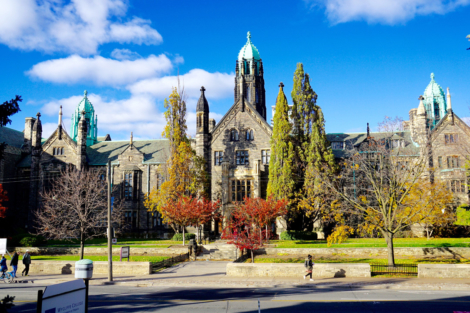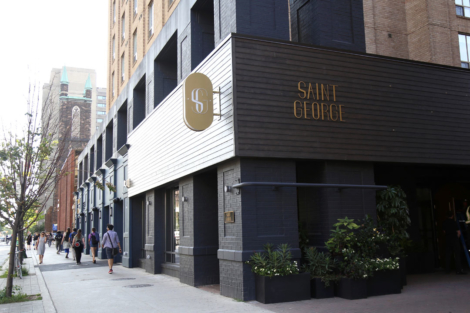The new School of Cities could be the pivotal voice we need for complex urban issues, as long as it pulls together
Re: “U of T’s School of Cities to Launch July 1”
U of T’s new School of Cities has vowed to tackle urban-related issues through interdisciplinary methods and collaborations. However, finding more coherent information on the partnerships or direction of this school has been unsatisfying. Apart from their slogans, the School of Cities’ website features pictures and short descriptions of the professors comprising the Interim Working Group, and three articles and two podcast links which are informative but overlap in content.
On the one hand, this is a frustrating start to an institution that encompasses many of the most important and immediate issues of our modernizing time. With Associate Director Shauna Brail calling the School “a big-tent approach” to urban research, and U of T President Meric Gertler claiming it to be a “hub in a global network” of scholars and practitioners, the school is not lacking in grand objectives. However, this has so far failed to reveal convincing short-term targets.
On the other hand, the school has only taken its very first public baby steps, and a definite outline of objectives often hurts the creativity of budding institutions. Cities are the playgrounds of the future, and though the school shouldn’t have to trudge carefully toward a path, they need to pave their way holistically. The extremely diverse group of professors seems to suggest an optimistic direction, as they draw from Civil and Mineral Engineering to Indigenous Health to Women and Gender Studies.
Perhaps the most exciting aspect about the School of Cities is the bridge it shall attempt to build between theory and practice. Hopefully the school will encourage U of T students to help build this bridge and contribute significantly to not only the initiatives, but the very soul of the institution.
For students and urban dwellers in general, never have cities felt more saturated with potential, yet held back by issues regarding housing, transportation, and public safety, to name a few. The School of Cities presents an exciting and critical opportunity for diverse urban communities to contribute to the dialogue of the future of cities.
Grace Ma is a second-year English and Environmental Sciences student at Trinity College.
We cannot have religious freedom at the expense of social equality
Re: “Trinity Western loses Supreme Court case on religious freedom v. LGBTQ+ rights”

IRIS DENG/THE VARSITY
The battle between the constitutional right to freedom of religion and LGBTQ+ rights has taken shape in Trinity Western University’s (TWU) Supreme Court case against the Law Societies of British Columbia and Ontario. Unsurprisingly, the university lost the case seven to two.
The very law that allows the evangelical Christian university to exist has been proven to have clear boundaries. When pitted against each other, religious freedom comes second in modern Canadian society to discrimination against LGBTQ+ people. The problem with the covenant signed by all TWU students is that it requires abstinence from any sexual intimacy, not only outside of a heterosexual marriage, but also from any intimacy that “violated the sacredness” of that marriage. This very clearly alienated the LGBTQ+ population, allowing TWU to deny them admission.
U of T campus group LGBTOUT, the intervenors on the case, brought this very point up, arguing that the proposed law school would bar LGBTQ+ students solely based on sexual or gender preferences, which is clearly a discriminatory action.
The case was a big win for the LGBTQ+ community as the Supreme Court clearly announced that the law must protect each and every individual of the Canadian population. The court’s decision came at a celebratory time, enhancing the joy and excitement for Pride Month.
This is not the first time TWU has faced the Supreme Court over religious freedoms. I expect it to continue happening over different issues until TWU recognizes that although religious freedom is crucial to a democratic society, its importance should never surpass the importance of equality in a society that is constantly growing and changing.
Varsha Pillai is a first-year Social Sciences student at University College.
Provost’s action plan does not account for safety or student leadership
Re: “Alcohol at Trinity events can no longer be paid for with student fees”

VASSILIA JULIA AL AKAILA/THE VARSITY
In an email correspondence informing Trinity College students of the administration’s action plan, the Office of the Provost mentions their “aim to improve transparency and communications, while focusing on education, safety and harm reduction, and leadership development.”
As a Trinity College student, I feel that there are numerous inconsistencies with this statement.
First, putting forward an action plan without adequate consultation with student leaders undermines the direct democracy and commitment to student autonomy that has defined Trinity College tradition. Preventing student leaders from spending student fees in a manner they deem fit does not make for effective leadership development. While it’s true that not all students are drinkers, the reality of student fees is that they do not always benefit each student individually.
Second, focusing on safety and harm reduction includes acknowledging that a significant percentage of young adults are going to drink. Harm reduction involves creating a safe environment in which students are familiar with their surroundings and have non-punitive support networks when it comes to alcohol consumption, including a sober patrol and Dons in case of emergency. Moving such events off campus does not guarantee such an environment.
Additionally, the claim that the administration created this action plan primarily due to a 10-month survey of students is dubious given the college’s response to a motion of no confidence passed at the Trinity College Meeting (TCM) last year.
The first meeting at the TCM included a motion of no confidence in which students shared their grievances regarding Dean Kristen Moore and her staff. The motion passed with an overwhelming majority, but it was then overlooked by Provost Mayo Moran, who ensured that she had “full confidence in [Moore].”
Avneet Sharma is a fourth-year English and Cinema Studies student at Trinity College.
The loss of popular locations for students points to a decline in affordability
Re: “Saint George hotel opens on Bloor Street West, replacing Holiday Inn”

SHANNA HUNTER/THE VARSITY
In July, the Saint George hotel officially opened in place of the Holiday Inn, Fox and Fiddle Pub, and New York Fries on Bloor Street West. After the Starbucks on College and Beverley Street also closed its doors earlier this year to make way for a condominium to be built by January 2020, there are now a total of four popular locations around campus that are no longer available for U of T students.
Holiday Inn housed many families when students visited U of T for the very first time. The Fox and Fiddle Pub had just the right vibe for all kinds of rendezvous, whether it be post-exam celebrations or simple get-togethers. New York Fries was the kitchen of Bloor Street that students resorted to after long hours at the library, often because they were too exhausted to walk any further.
Henceforth, these places will live only in the memories of soon-to-be graduates, while prospective students will no longer share the experience of what had already become part of the ‘typical U of T student’ routine.
From a student perspective, opening a luxury hotel such as the Saint George in the Annex is not ideal, considering its expensive price point of almost $300 per night. Although Gyubee — a somewhat pricey Japanese BBQ joint just across from the Saint George — had already broken the concept of affordable eateries in the Annex, the Saint George will now completely reform the image of a cost-friendly neighborhood for students. This end of the Annex is looking more and more like luxurious Yorkville.
Annie Hu is a third-year Criminology, Music, and Sociology student at Woodsworth College.


